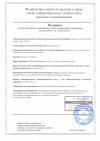Резюме
| Название статьи | РАССТРОЙСТВА ПИЩЕВОГО ПОВЕДЕНИЯ: ПРЕДИКТОРЫ РАЗВИТИЯ ПРИ НАРУШЕНИЯХ УГЛЕВОДНОГО ОБМЕНА |
|---|---|
| Title | EATING DISORDERS: PREDICTORS OF DEVELOPMENT IN DISORDERS OF CARBOHYDRATE METABOLISM |
| Категория | номер 1 за 2023 год (опубликован 04.04.2023) |
| Тип | Обзорная статья |
| Ключевые слова | расстройства пищевого поведения, ранние нарушения углеводного обмена, сахарный диабет 2 типа |
| Keywords | eating disorders, early disorders of carbohydrate metabolism, type 2 diabetes mellitus |
| Скачать | Скачать статью |
| doi | 10.52485/19986173_2023_1_137 |
| УДК | 616.4 |
| Резюме | Резюме. В настоящее время появляется всё больше сведений о влиянии расстройств пищевого поведения на формирование социально-значимых хронических неинфекционных заболеваний и метаболических расстройств, в том числе, ожирения, нарушенной толерантности к углеводам, сахарного диабета 2 типа. Целью проведения настоящего литературного обзора явилось обобщить сведения о механизмах регуляции пищевого поведения и охарактеризовать их особенности у пациентов с углеводными нарушениями на основе анализа имеющихся научных статей, индексируемых в базах данных РИНЦ, PubMed и Web of Science. Так, по результатам проведенного поиска, к факторам, повышающим риск развития расстройств пищевого поведения, помимо наследственной предрасположенности, относят женский пол, более молодой возраст, высокий ИМТ, сопутствующие психические заболевания. Расстройства пищевого поведения достаточно распространены среди пациентов, страдающих как ранними нарушениями углеводного обмена, так и сахарным диабетом. Нарушенные паттерны пищевого поведения могут выступать в качестве дополнительных факторов, способствующих развитию сахарного диабета 2 типа, в то время как сахарный диабет 1 типа является самостоятельным предиктором развития расстройств пищевого поведения. Расстройства пищевого поведения у лиц с нарушением метаболических процессов способствуют ухудшению гликемического контроля, развитию дислипидемии и в целом могут ухудшать контроль заболевания у пациентов с углеводными нарушениями |
| Список литературы | 1. Болотова Н.В., Курдиян М.С., Филина Н.Ю. Нейроэндокринные механизмы регуляции пищевого поведения (обзор). Саратовский научно-медицинский журнал. 2020. 16 (3). 707-713. |
| 2. Скугаревский О.А. Нарушения пищевого поведения: монография. Минск. БГМУ. 2007. 340. | |
| 3. American Psychiatric Association. Diagnostic and Statistical Manual of Mental Disorders, Fifth Edition (DSM-5). Arlington, VA: American Psychiatric Publishing. 2013. 87-122. | |
| 4. Власова С.А., Азисова Э.М., Исакова Д.Н., Курмангулов А.А. Сложности диагностики нарушений углеводного обмена в условиях первичного звена здравоохранения. Медицинская наука и образование Урала. 2020. 2 (102). 87-90. doi: 10.36361/1814-8999-2020-21-2-87-90. | |
| 5. Кибитов А.О., Мазо Г.Э. Генетические исследования нарушений пищевого поведения: выход из замкнутого круга нозологической систематики. Социальная и клиническая психиатрия. 2016. 26 (4). 63–70. | |
| 6. Pursey K.M., Hay P., Bussey K., Trompeter N., Lonergan A., Pike K.M., Mitchison D. Diabetes and disordered eating behaviours in a community-based sample of Australian adolescents. Journal of Eating Disorders. 2020. 8(1). doi:10.1186/s40337-020-0282-y. | |
| 7. Baldini G., Phelan K.D. The melanocortin pathway and control of appetite-progress and therapeutic implications. J Endocrinol. 2019. 241 (1). 1-33. | |
| 8. Duan D.M., Jhang J.Y., Wu S., et al. Modification effect of sex and obesity on the correlation of LEP polymorphisms with leptin levels in Taiwanese obese women. Mol Genet Genomic Med. URL: https://doi.org/10.1002/mgg3 .1113 | |
| 9. Тихоненко Е.В., Цой У.А., Васильева Е.Ю., Бабенко А.Ю. Характеристики пищевого поведения и уровень гормонов, регулирующих аппетит, у пациентов с сахарным диабетом 2 типа и индексом массы тела выше 35 кг/м2. Ожирение и метаболизм. 2018. 15 (1). 30-38. doi: 10.14341/OMET2018130-38. | |
| 10. Londraville R.L., Prokop J.W., Duff R.J., et al. On the molecular evolution of leptin, leptin receptor, and endospanin. Front Endocrinol (Lausanne). 2017. 8-58. doi: 10.3389/fendo.2017.00058. | |
| 11. Al Qarni A.A., Joatar F.E., Das N., et al. Association of Plasma Ghrelin Levels with Insulin Resistance in Type 2 Diabetes Mellitus among Saudi Subjects. Endocrinol Metab (Seoul). 2017. 32 (2). 230-240. doi: 10.3803/EnM.2017.32.2.230 | |
| 12. Ali T.M., Mehanna O.M., El Askary A. The association between ghrelin levels and markers of arterial stiffness and inflammatory markers in Saudi subjects with metabolic syndrome. Diabetes Metab Syndr. 2017. 11 (2). 721-725. doi: 10.1016/j.dsx.2017.05.005. | |
| 13. Климонтов В.В., Булумбаева Д.М., Фазуллина О.Н. и др. Дефицит грелина у больных сахарным диабетом 2-го типа: взаимосвязь с ожирением, дисфункцией жировой ткани и вариабельностью гликемии. Терапевтический архив. 2019. 91(10). 28-33. DOI: 10.26442/00403660.2019.10.000150 | |
| 14. Xing Y.X., Yang L., Kuang H.Y., Gao X.Y., Liu H.L. Function of obestatin in the digestive system. Nutrition. 2017. 34. 21-28 | |
| 15. Achari A.E., Jain S.K. Adiponectin, a Therapeutic Target for Obesity, Diabetes, and Endothelial Dysfunction. Int J Mol Sci. 2017. 18 (6). 1321 | |
| 16. Parfenova N.S., Tanyansky D.A. Adiponectin: effects on metabolic and cardiovascular disorders. Arterial Hypertension. 2013. 19 (1). 84-96. | |
| 17. Gupta P., Bala M., Gupta S., et al. Efficacy and risk profile of anti-diabetic therapies: Conventional vs traditional drugs-A mechanistic revisit to understand their mode of action. Pharmacol Res. 2016. 113. 636-74 | |
| 18. Engel J.A., Jerlhag E. Role of Appetite-Regulating Peptides in the Pathophysiology of Addiction: Implications for Pharmacotherapy. CNS Drugs. 2014. 28(10). 875-886. doi: 10.1007/s40263-014-0178-y | |
| 19. Helder S.G., Collier D.A. The genetics of eating disorders. Curr. Top. Behav. Neurosci. 2011. 6. 157-175. doi: 10.1007/7854_2010_79 | |
| 20. Rozenblat V., Ong D., Fuller-Tyszkiewicz M., Akkermann K., Collier D., Engels R. C.M.E., Krug I. A systematic review and secondary data analysis of the interactions between the serotonin transporter 5-HTTLPR polymorphism and environmental and psychological factors in eating disorders. Journal of Psychiatric Research. 2017. 84. 62-72. doi:10.1016/j.jpsychires.2016.09.023 | |
| 21. Mikolajczyk E., Grzywacz A., Samochowiec J. The association of catechol-O-methyltransferase genotype with the phenotype of women with eating disorders. Brain Res. 2010. 1307. 142-148 | |
| 22. Ishiguro H., Onaivi E.S., Horiuchi Y., Imai K., Komaki G., et al. Functional polymorphism in the GPR55 gene is associated with anorexia nervosa. Synapse. 2011. 65. 103-108 | |
| 23. Miyasaka K., Hosoya H., Sekime A., Ohta M., Amono H., et al. Association of ghrelin receptor gene polymorphism with bulimia nervosa in a Japanese population. J. Neural Transm. 2006. 113. 1279-1285 | |
| 24. Monteleone P., Tortorella A., Castaldo E., Maj M. Association of a functional serotonin transporter gene polymorphism with binge eating disorder. Am. J. Med. Genet. B Neuropsychiatr. Genet. 2006. 141. 7-9. | |
| 25. Genzer Y. et al. Effect of dietary fat and the circadian clock on the expression of brain- derived neurotrophic factor (BDNF). Molecular and cellular endocrinology. 2016. 430. 49-55. doi: 10.1016/j.mce.2016.04.015. | |
| 26. Castellini G., Franzago M., Bagnoli S., et al. Fat mass and obesity-associated gene (FTO) is associated to eating disorders susceptibility and moderates the expression of psychopathological traits. 2017. 12 (3). doi:10.1371/journal.pone.0173560 | |
| 27. Nagata J. M., Garber A. K., Tabler J. L., Murray S. B., Bibbins-Domingo K. Prevalence and Correlates of Disordered Eating Behaviors Among Young Adults with Overweight or Obesity. Journal of General Internal Medicine. 2018. 33 (8). 1337-1343. doi:10.1007/s11606-018-4465-z. | |
| 28. Petroni M.L., Barbanti F.A., Bonadonna R., Bruno G., Caletti M.T., Croci M., Marchesini G. Dysfunctional eating in type 2 diabetes mellitus: A multicenter Italian study of socio-demographic and clinical associations. Nutrition, Metabolism and Cardiovascular Diseases. 2019. doi:10.1016/j.numecd.2019.06.006. | |
| 29. Nip A.S.Y., Reboussin B.A., Dabelea D., et al. Disordered Eating Behaviors in Youth and Young Adults With Type 1 or Type 2 Diabetes Receiving Insulin Therapy: The SEARCH for Diabetes in Youth Study. Diabetes Care. 2019. doi:10.2337/dc18-2420. | |
| 30. Yang F., Liu A., Li Y., Lai Y., Wang G., Sun C., Teng W. Food Addiction in Patients with Newly Diagnosed Type 2 Diabetes in Northeast China. Frontiers in Endocrinology. 2017. 8. doi:10.3389/fendo.2017.00218. | |
| 31. Garca-Mayor R., Garca-Soidn F., Salgado Barreira A. Prevalence of Eating Disorders in Individuals with Type 2 Diabetes: A Cohort Comparison of Patients and Controls. Experimental and Clinical Endocrinology & Diabetes Reports. 2017. 04 (01). 7-9. doi:10.1055/s-0043-103347. | |
| 32. Parry S., Woods R., Hodson L., Hulston C. A Single Day of Excessive Dietary Fat Intake Reduces Whole-Body Insulin Sensitivity: The Metabolic Consequence of Binge Eating. Nutrients. 2017. 9 (8). 818. doi:10.3390/nu9080818 | |
| 33. Nieto-Martnez R., Gonzlez-Rivas J.P., Medina-Inojosa J.R., Florez H. Are Eating Disorders Risk Factors for Type 2 Diabetes? A Systematic Review and Meta-analysis. Current Diabetes Reports. 2017. 17 (12). doi:10.1007/s11892-017-0949-1. | |
| 34. Исакова Д.Н., Дороднева Е.Ф., Белокрылова Л.В., Курмангулов А.А., Петров И.М. Роль факторов питания в формировании кардиоваскулярного риска у больных сахарным диабетом 2 типа. Вопросы питания. 2021. 90 (5). 104-114. doi: https://doi.org/10.33029/0042-8833-2021-90-5-104-114 | |
| 35. Herbozo S., Flynn P.M., Stevens S.D., Betancourt H. Dietary Adherence, Glycemic Control, and Psychological Factors Associated with Binge Eating Among Indigenous and Non-Indigenous Chileans with Type 2 Diabetes. International Journal of Behavioral Medicine. 2015. 22 (6). 792-798. doi:10.1007/s12529-015-9478-y | |
| 36. Sakai R., Hashimoto Y., Ushigome E., Miki A., Okamura T., Matsugasumi M., Fukui M. Late-night-dinner is associated with poor glycemic control in people with type 2 diabetes: The KAMOGAWA-DM cohort study. Endocrine Journal. 2017. 65 (4). 395-402. doi:10.1507/endocrj.ej17-0414 | |
| 37. Joseph M., Shyamasunder A.H., Mammen P., Thomas N. Type 1 diabetes mellitus and eating disorders. International Journal of Diabetes in Developing Countries. 2016. 37 (4). 502-506. doi:10.1007/s13410-016-0530-5. | |
| 38. Berger G., Waldhoer T., Barrientos I., Kunkel D., Rami-Merhar B.M., Schober E., Wagner G. Association of insulin-manipulation and psychiatric disorders: A systematic epidemiological evaluation of adolescents with type 1 diabetes in Austria. Pediatric Diabetes. 2018. doi:10.1111/pedi.12784. | |
| 39. Cherubini V., Skrami E., Iannilli A., Cesaretti A., Paparusso A. M., Alessandrelli M. C., Gesuita R. Disordered eating behaviors in adolescents with type 1 diabetes: A cross-sectional population-based study in Italy. International Journal of Eating Disorders. 2018. doi:10.1002/eat.22889. | |
| Resume | Abstract. Currently, there is more and more information about the influence of eating disorders on the formation of socially significant chronic non-infectious diseases and metabolic disorders, including obesity, impaired carbohydrate tolerance, and type 2 diabetes mellitus. The purpose of this literature review was to summarize information about the mechanisms of regulation of eating behavior and to characterize their features in patients with carbohydrate disorders. Аccording to the results of the search, the factors that increase the risk of developing eating disorders, in addition to hereditary predisposition, include the female gender, younger age, high BMI, and concomitant mental illness. Eating disorders are quite common among patients suffering from both early disorders of carbohydrate metabolism and diabetes mellitus. Disturbed eating patterns may act as additional contributing factors to the development of type 2 diabetes, while type 1 diabetes is a predictor of the development of eating disorders. Eating disorders in persons with metabolic disorders contribute to the deterioration of glycemic control, the development of dyslipidemia, and generally worsen the control of the disease. |
| Автор 1 | Исакова Дилара Наилевна |
| Автор 2 | Петров Иван Михайлович |
| Автор 3 | Евгеньева Елизавета Андреевна |
| Автор 4 | Курмангулов Альберт Ахметович |
| Автор 5 | Трошина Ирина Александровна |
| Автор 6 | Василькова Татьяна Николаевна |



